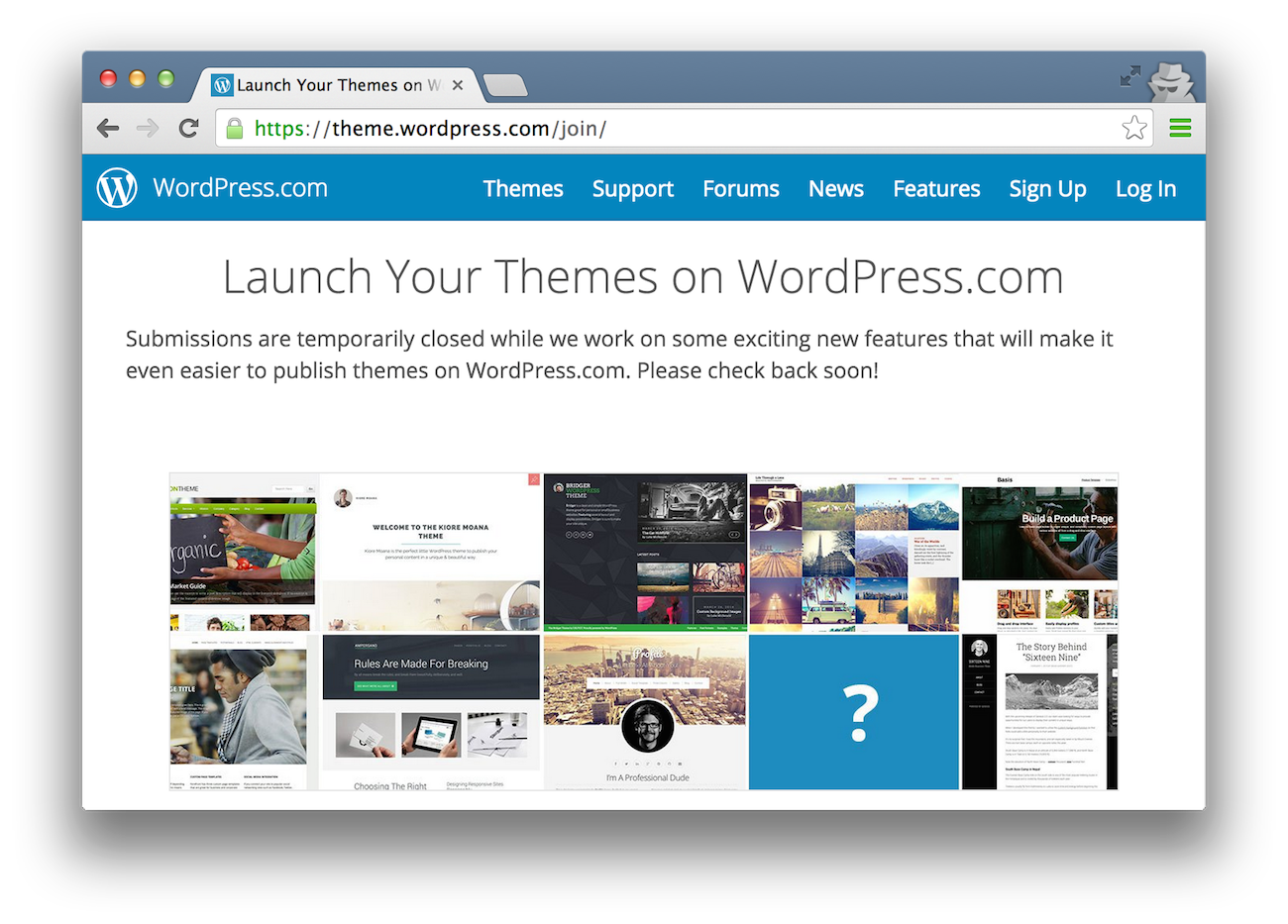In March 2014, WordPress.com opened its marketplace to new theme authors. Prior to that time, new sellers were added via invitation only. A year ago there were only 300 themes available to WordPress.com users, but after having the marketplace open to new authors that count is up to 345.
Recently the submission form disappeared from the site with a message that WordPress.com would be keeping it temporarily closed in order to add new features that make the process easier.
Array founder Mike McAlister recently published an article that detailed his experience selling on the WordPress.com marketplace. One of the main drawbacks was the lack of efficiency in handling the queue for new theme submissions.
The review process on WordPress.com is long. I’m not talking about weeks long, I’m talking about months long. Each Array theme review has taken at least a month, usually longer. Our latest theme for WP.com, Camera, took four months from the day I submitted it to the day it was released.
In addition to painfully long queues, theme authors have also been disappointed with WordPress.com’s recent lack of promotion for commercial themes. These factors contributed to McAlister’s decision to focus on promoting his products through more efficient distribution channels and return to Themeforest.
In April, WordPress.com theme author Sami Keijonen posted about his recent difficulties with the marketplace after noticing that WordPress.com removed the submission form for new authors. He summarized some of the sources of confusion for commercial theme authors:
- WordPress.com basically stopped marketing commercial themes. (However, they do tweet about new themes.)
- We have a private blog for themers but other than that, there isn’t any conversation between developers or WordPress.com staff. They did send a enquiry a while ago so that might help.
- The review process takes months for commercial themes.
- They seem to want really simple themes with simple design decisions. That’s fine by me but isn’t that kind of “forcing” the end user to like certain types of themes if they don’t have any options?
- I would have wanted more accessibility-ready themes in WordPress.com like mine, but it seems that isn’t priority.
I contacted Automattic to find out why the submission form has been removed and when authors can expect for it to be re-opened. The company’s official statement indicates that opening up the marketplace was a temporary experiment and that there is no ETA for relaunching it.
It’s important to note that current WordPress.com sellers can submit new themes for possible launch. We’re not closed for new theme submission. We experimented with a public form for themes from new shops last year, and we had a ton of great submissions from theme shops around the world. We took it down last fall while we worked on getting ahead of all the new theme reviews that it created. We’ll put it up again but we don’t have an exact date in mind. We do still reach out to new shops with great themes. We’re always excited to find awesome theme shops.
The company’s statement regarding the change in marketing clarifies that it is looking for new strategies to promote commercial themes.
We may not do blog posts any more, but we haven’t stopped marketing premium themes. They’re featured prominently on wordpress.com/themes and as part of our Business Plan. Plus, we’re exploring more ways to put premium themes in front of users.
In the future, premium theme shops can expect better feedback around the themes they submit, quicker launches, and more communication in general from the WordPress.com Theme Team. We’re excited about what we can continue to do for the world of themes with our sellers’ help.
Automattic has no set time frame for launching these improvements, but it should be reassuring for commercial theme authors to know that the company is tackling the inefficiency that was bogging down the system. For the time being, new commercial theme authors looking to submit products to the marketplace are out of luck, but Automattic may decide to open it up again to continue the experiment in the future.

It was bad timing for me. I sold my previous theme site so I can focus on .com themes. Only to find out a month later they suspended submissions. I later realized that it appears they have no intention of reopening it, but if they do, it’s a long way off. I believe it’s been closed for 6 months now.
As I mentioned, it was bad timing because this happened right after I sold my successful theme site for the chance to do some blogging and to design themes for wordpress.com. It turned out it was a bad move. Now I’ve had to start a new theme site from scratch (including starting with no themes) and then go back to wordpress.org and rebuild what I once had. Unfortunately this takes a long time. So far I’ve got 2 premium and free themes (a 3rd on the way).
Hearing stories like Sarah’s post here, and also the one about Mike McAlister and now Sami Keijonen, make wordpress.com very discouraging.